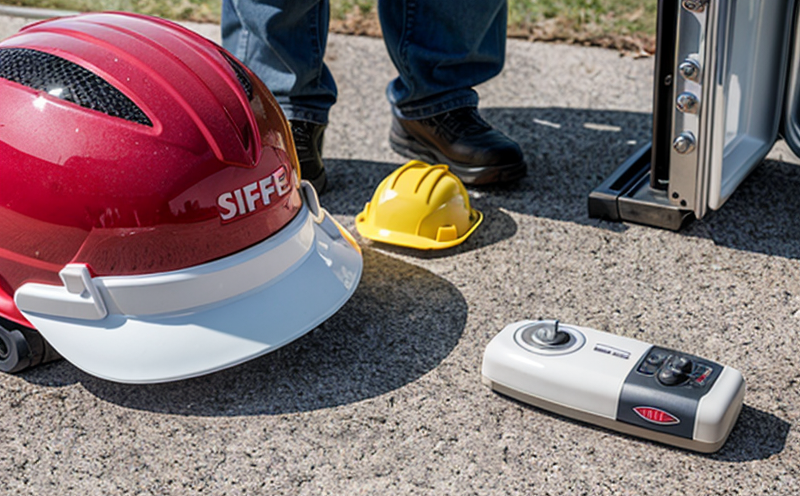ISO 18843 Fire Detection and Alarm System Testing
The ISO 18843 standard provides a set of requirements and testing procedures for fire detection and alarm systems intended to be installed in marine and ship equipment. This service ensures that all safety appliances conform to the highest international standards, thereby enhancing vessel safety and compliance with maritime regulations.
Our comprehensive testing process involves rigorous evaluation of various components including smoke detectors, heat sensors, manual call points, and sounders. Each system undergoes a series of performance tests designed to replicate real-world conditions at sea. Compliance with ISO 18843 is critical for the reliability and effectiveness of fire detection systems in preventing and mitigating potential incidents aboard ships.
The testing process begins with thorough inspection and documentation of the equipment to be tested, followed by functional testing under controlled conditions. This includes checking the response times, accuracy, and integration capabilities of the alarm system components. Our state-of-the-art facilities are equipped with specialized test chambers that simulate environments found on ships, ensuring realistic performance evaluations.
Once initial testing is completed, our experts conduct comprehensive analysis to identify any deviations from ISO 18843 requirements. Any non-compliance issues are documented and reported promptly along with recommendations for necessary adjustments or replacements. Our team ensures that all repairs or modifications are made according to industry best practices before retesting the equipment.
Finally, upon successful completion of all tests, we issue detailed reports certifying compliance with ISO 18843 standards. These reports serve as crucial documentation for regulatory authorities and insurance companies, providing peace of mind regarding vessel safety measures. Our commitment to excellence ensures that every test adheres strictly to international guidelines while addressing specific challenges faced by the maritime industry.
Use Cases and Application Examples
- Smoke Detectors: Testing smoke detectors helps ensure they respond accurately when needed, especially in confined spaces like engine rooms or cargo holds where fires can spread rapidly.
- Heat Sensors: These sensors are vital for detecting early signs of fire by monitoring ambient temperatures, which is crucial for preventing damage during emergencies.
- Manual Call Points: Ensuring these devices operate correctly allows crew members to signal alarms manually if automatic systems fail.
- Sounders: Proper testing guarantees clear and audible alerts that can be heard throughout the vessel, enabling quick evacuation in case of fire.
| Test Parameter | Description |
|---|---|
| Response Time | The time taken for the system to activate after sensing a fire hazard. |
| Accuracy | The degree of correctness in detecting actual fires while minimizing false alarms. |
| Integration Capabilities | Ensuring seamless communication between different fire detection and alarm components. |
| Sound Level | The intensity of the sound produced by the alarm, ensuring it is audible over background noise levels. |
Why Choose This Test
Selecting ISO 18843 fire detection and alarm system testing offers several advantages. Firstly, it guarantees that all life-saving appliances meet stringent international standards, enhancing overall vessel safety. Compliance with these regulations is not only mandatory but also essential for ensuring the well-being of crew members and passengers.
Secondly, regular testing helps prevent potential failures during critical moments when every second counts. By identifying issues early on through rigorous evaluation processes, we can address them promptly before they escalate into serious problems. This proactive approach contributes significantly to maintaining reliable systems that perform as expected in emergency situations.
Thirdly, choosing our service ensures peace of mind for quality managers and compliance officers responsible for managing maritime operations. Our expertise and experience allow us to provide thorough assessments that cover all aspects of fire detection and alarm systems, leaving no stone unturned when it comes to ensuring optimal performance.
Lastly, selecting ISO 18843 testing demonstrates a commitment to excellence in adhering to best practices within the maritime sector. It reflects well on an organization's reputation and contributes positively towards achieving certification requirements from various governing bodies.
Environmental and Sustainability Contributions
The implementation of ISO 18843 fire detection and alarm systems plays a crucial role in promoting environmental sustainability within the marine sector. By enhancing vessel safety, these systems help prevent accidents that could lead to oil spills or other environmental disasters at sea. Early detection capabilities ensure prompt response actions, minimizing damage caused by fires.
Moreover, reliable fire detection systems contribute to reducing waste and resource consumption associated with unnecessary evacuations or false alarms. Properly functioning alarm systems only activate when truly necessary, thus conserving energy resources used in maintaining the vessels' integrity during emergencies.
In addition, compliance with ISO 18843 standards promotes responsible stewardship of maritime environments by fostering safer working conditions for crew members and reducing risks to ecosystems surrounding ports and harbors. This commitment aligns closely with global efforts towards sustainable development goals set forth by international organizations like the United Nations.
Our service supports these objectives through meticulous testing procedures that prioritize both human safety and environmental protection, ensuring that vessels operate efficiently while minimizing their impact on natural resources.





